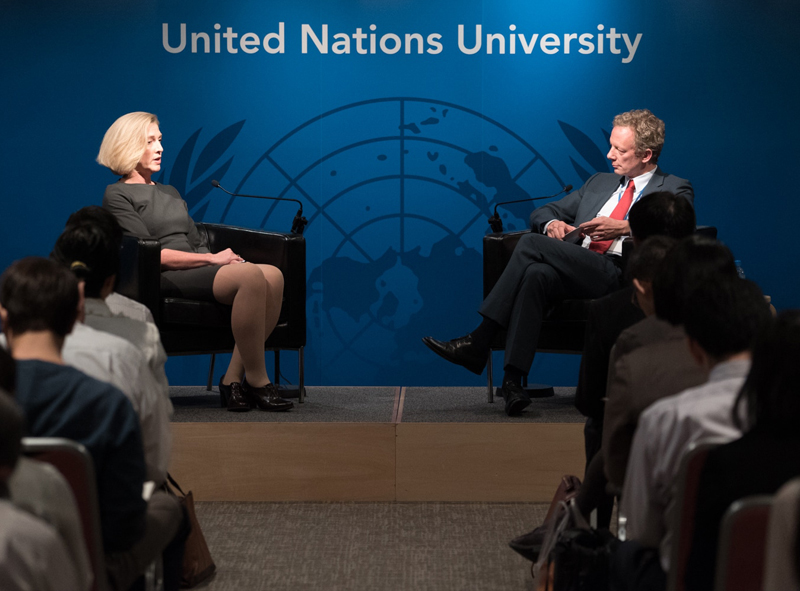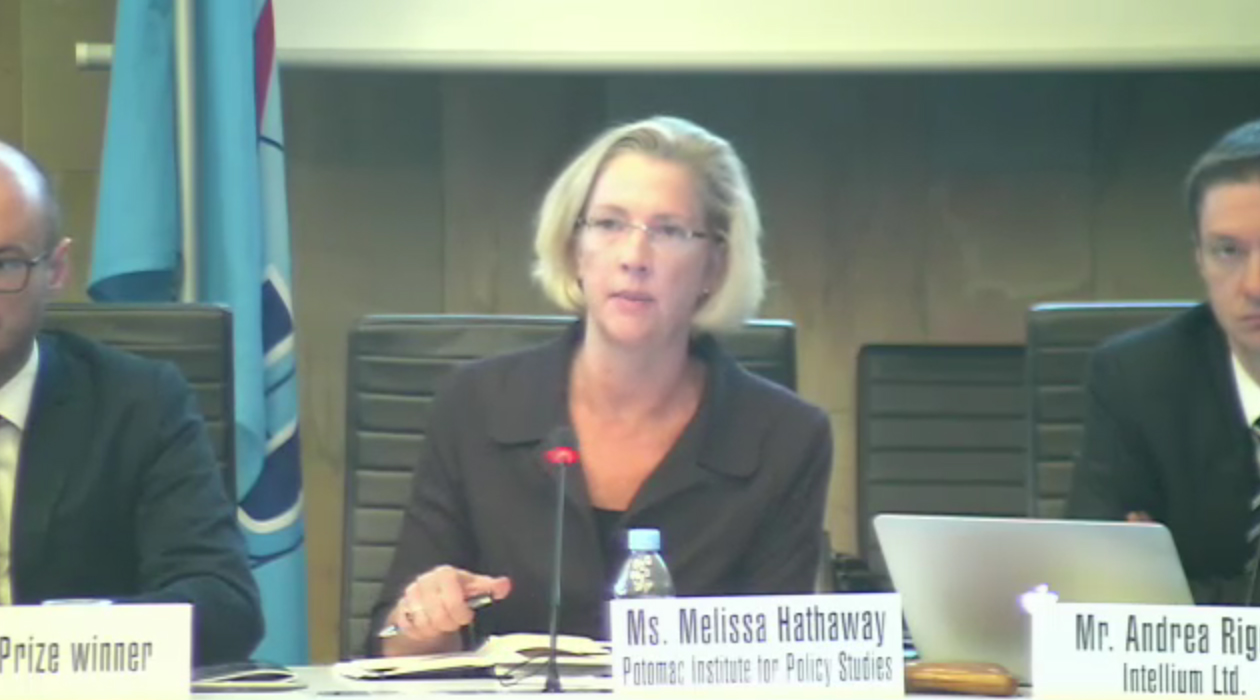Divisions
Senior Fellow Melissa Hathaway was quoted in an article from SC Magazine UK entitled “France unveils cyber command in response to 'new era in warfare' .” Ms. Hathaway commented on the importance of France’s creation of Cybercom for cyber preparedness:
“In 2011, France declared that it would become a world cyber power and has been making investments to achieve that goal ever since,” she said. “This includes strengthening the authorities of ANSSI and establishing a Cyber Defence General Officer with associated operational units (the beginning of Cyber Command).”
Read the full piece here .
“France Cyber Readiness at a Glance,” is the third of a series of country reports assessing national-level preparedness for cyber risks based on the Cyber Readiness Index (CRI) 2.0 methodology. This report provides an extensive analysis of France's cyber security-related efforts and capabilities, and follows similar reports of other G7 countries evaluating their commitment and maturity to closing the gap between their current cyber security posture and the national cyber capabilities needed to support their digital future.
Ms. Hathaway is a PIPS Senior Fellow and member of the Board of Regents. She led cybersecurity initiatives for Presidents George W. Bush and Barack Obama until August 2009, when she left to establish Hathaway Global Strategies, LLC. The CRI team additionally includes Chris Demchak, Jason Kerben, Jennifer McArdle, and Francesca Spidalieri.

Potomac Institute for Policy Studies Senior Fellow and Cyber Readiness Index (CRI) principal investigator Melissa Hathaway spoke at the United Nations University (UNU) Headquarters in Tokyo as a part of their Conversation Series. The UNU Conversation Series gives experts, scholars, and world leaders a platform to share their personal insights into key issues in their fields. Melissa Hathaway’s conversation, “The Future of Cybersecurity,” with Sebastian von Einsiedel, Director of the UNU Center for Policy Research, explores how a framework for universal cybersecurity norms could be achieved.
Leading cybersecurity expert Melissa Hathaway spoke about the immediate and future threats to country critical services and infrastructures and the Internet economy. She knows the challenges and requirements to become Cyber Ready at the national level. She is the developer of a unique methodology for evaluating and measuring the level of preparedness for certain cybersecurity risks, known as the Cyber Readiness Index. The Cyber Readiness Index 2.0 (CRI 2.0) shows that few countries have aligned their digital agenda with their cybersecurity agenda, and seeks to incentivize this alignment by bringing attention to each country’s Internet-infrastructure dependencies and vulnerabilities, and the national economic erosion caused by cyber insecurity. The CRI 2.0 is the only methodology publicly available in Arabic, Chinese, English, French, Russian, and Spanish, and is viewed by countries, international institutions, think tanks, researchers, and corporations as a balanced resource that could be utilized to evaluate and measure cyber preparedness at national, regional, and local levels.
The CRI 2.0 methodology continues to gain global recognition with the publication of each detailed country profile. Since the publication of the methodology in 2015, nine country profiles have been published for France, Germany, India, Italy, Japan, the Netherlands, the Kingdom of Saudi Arabia, the United Kingdom, and the United States. These profiles draw attention to each country’s level of cyber preparedness and highlight unique approaches toward becoming Cyber Ready.
Melissa Hathaway serves as a Potomac Institute for Policy Studies Senior Fellow and member of the Board of Regents. She led cybersecurity initiatives for Presidents George W. Bush and Barack Obama and is President of Hathaway Global Strategies, LLC.
The Potomac Institute for Policy Studies is an independent, 501(c)(3), not-for-profit public policy research institute. The Institute identifies and shepherds discussion on key science and technology issues facing society. From these discussions, the Institute develops meaningful policy options and ensures their implementation at the intersection of business and government.
For media inquiries please contact: This email address is being protected from spambots. You need JavaScript enabled to view it., 703-525-0770.
Follow us on Twitter: @CyberReadyIndex
 The CRI country profiles (France, Germany, India, Italy, Japan, the Netherlands, the United Kingdom, the Kingdom of Saudi Arabia, and the United States) have been translated into Chinese. Many thanks to the Shanghai Institute for International Studies (SIIS) for their translation and publication. Please click here to download.
The CRI country profiles (France, Germany, India, Italy, Japan, the Netherlands, the United Kingdom, the Kingdom of Saudi Arabia, and the United States) have been translated into Chinese. Many thanks to the Shanghai Institute for International Studies (SIIS) for their translation and publication. Please click here to download.
The Cyber Readiness Index 2.0 shows that few countries have aligned their national economic vision (digital agenda) with their national security agenda, and seeks to incentivize this alignment by bringing attention to each country's Internet-infrastructure dependencies and vulnerabilities, and the national economic erosion caused by cyber insecurity. The CRI 2.0 builds on the Cyber Readiness Index 1.0 and provides a comprehensive, comparative, experience-based methodology to evaluate countries' commitment and maturity to closing the gap between their current cyber security posture and the national cyber capabilities needed to support their digital future.
The CRI 2.0 methodology is available in Arabic, Chinese, English, French, Russian, and Spanish, and is currently being applied to 125 countries. The resulting country reports are based on over seventy unique indicators across seven essential elements to discern operationally ready activities and identify areas for improvement in the following categories: national strategy, incident response, e-crime and law enforcement, information sharing, investment in research and development (R&D), diplomacy and trade, and defense and crisis response.
The CRI country profiles of France, Germany, India, Italy, Japan, the Netherlands, the United Kingdom, the Kingdom of Saudi Arabia, and the United States can be found at the following link: https://potomacinstitute.org/academic-centers/cyber-readiness-index.
Event Synopsis: Building and ensuring trust in cyberspace is top of mind for global leaders, and reinforcing collaboration among the various stakeholders is key to achieving all of the seventeen Sustainable Development Goals (SDGs) set by the United Nations in September 2015. In particular, universal and affordable access to ICTs was recognized as pivotal for bringing the 2030 Sustainable Development Agenda forward. Increased ICT uptake and Internet connectivity, however, is not sufficient, let alone sustainable, if the underlying infrastructure and the devices connected to it are not safe and secure.
The WSIS Outcome Review Process, which culminated in the adoption of the “Outcome document of the High-Level meeting of the UN General Assembly on the overall review of the implementation of the outcomes of the World Summit on the Information Society” in December 2015, reiterated the importance of Building Confidence and Security in the use of ICTs. It further recognized the challenges that countries, in particular developing countries, face in building confidence and security and called for renewed focus in capacity building and awareness raising among users of ICTs, particularly among the poorest and most vulnerable.
This session brought together various stakeholders to discuss how comprehensive national cybersecurity strategies at an early connectivity stage are an essential first step for a successful transition to a safe and sustainable digital ecosystem, and what the role of the different players within a country should and can be in that process.
Formal remarks as given by Melissa Hathaway, Potomac Institute for Policy Studies


